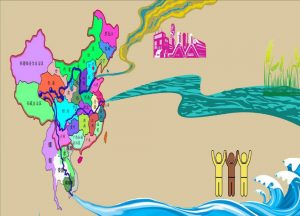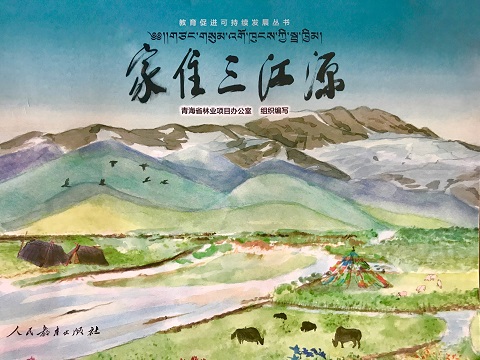Community Co-management Project in Three-River Source
Three-River Source is the place of origin of the Yellow River, Yangtze River, and Mekong River. Fittingly, it is known as the water tower of Asia as it supplies fresh water to the over 40% of the world’s population located there. As one of the most biologically diverse regions in China, Three-River Source is of great importance for maintaining ecological security locally, as well as to the integrity of the world’s ecosystem.
In 2014, as the major social organization dedicated to nature conservation in Three-River Source region, FGC launched a  community co-management project in the ZhaLing and E’Ling lake regions. FGC collaborated with Qinghai Forestry Department and officials from MaDuo district to promote environmental action among local communities. On the district level, this project aims to promote the formation of a group of leaders for community co-management. On the community level, it seeks to facilitate the establishment of a community co-management commission, the members of which were chosen based on public votes. Moreover, this project facilitated communication among different stakeholders, including the Forestry Department, Conservation Station, government officials, and village committees. From this cooperation, a community co-management plan for the village was designed. Through various co-management activities, the public has shown increased awareness towards the environment, the environment of the village improved significantly, and more environmental protection activities have been carried out.
community co-management project in the ZhaLing and E’Ling lake regions. FGC collaborated with Qinghai Forestry Department and officials from MaDuo district to promote environmental action among local communities. On the district level, this project aims to promote the formation of a group of leaders for community co-management. On the community level, it seeks to facilitate the establishment of a community co-management commission, the members of which were chosen based on public votes. Moreover, this project facilitated communication among different stakeholders, including the Forestry Department, Conservation Station, government officials, and village committees. From this cooperation, a community co-management plan for the village was designed. Through various co-management activities, the public has shown increased awareness towards the environment, the environment of the village improved significantly, and more environmental protection activities have been carried out.
Ecological and Environmental Education in Three-River-Source

FGC has worked with six primary and middle schools in the Three-River-Source region since 2015.While creating the book My Home is in Sanjiangyuan, FGC actively reached out to local teachers and students to implement environmental education. As a result, environmental education courses have officially started in selected schools in various forms and fashions.
In 2016, this project expanded to four major conservation areas, influencing 21 villages and 6 schools. The extended project engaged local people in environmental protection activities by fostering positive environmental attitudes, teaching ecological knowledge, and developing protecting and patrolling skills.
By October 2018, this project has directly benefited 8405 individuals, including 6875 herders and 1170 students/teachers. It has indirectly benefited 55584 individuals, including 49704 herders and 5880 students/teachers. This project has won first prize in the Community Service Projects category of Ford’s Environmental Protection Competition in 2016.
Landscape Conservation and Sustainable Livelihood Development Project
Since 2017, FGC has worked intensively with a Tibetan community, Tuanjie Village, on Landscape Conservation and Livelihood Development. The ecosystem in Tuanjie Village is very fragile and its soil is subject to erosion. Once environmental damage happens, it’s extremely difficult to recover and the cost is huge. Therefore, the task of constructing an ecological civilization is of great importance. At present, Tuanjie Village faces the challenges of landscape destruction, household waste, wastewater management, community awareness, capacity enhancement, and livelihood development.
This project will increase the capacity of the community and school. It will also cultivate local, community-based organizations through participatory training and aid them in developing multi-stakeholder cooperation mechanisms with the goal of creating and registering a Community Conserved Area. This will promote sustainable management of local natural resources, recognition of the importance of natural and cultural heritage, and develop a community livelihood. Furthermore, it will display the successful results that can be gained from Community Conserved Areas, sustainable community development, and policy change through multi-stakeholder seminars.

Research and advocacy
At policy level, FGC advocates for more community engagement in decision-making and is responsible for developing crucial policy documents for Three-River-Source National Park, especially on community development planning.


